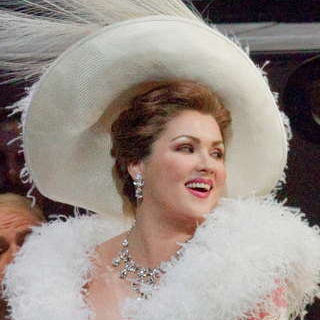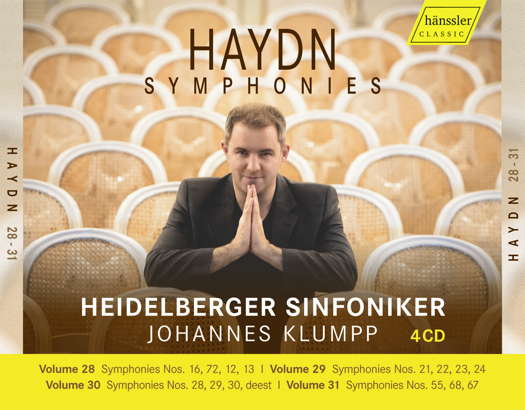 SPONSORED: Vocal Glory - Massenet's Manon in HD from New York Metropolitan Opera, enjoyed by Maria Nockin.
SPONSORED: Vocal Glory - Massenet's Manon in HD from New York Metropolitan Opera, enjoyed by Maria Nockin.
All sponsored features >>
 VIDEO PODCAST: John Dante Prevedini leads a discussion about The Creative Spark, including contributions from Ryan Ash, Sean Neukom, Adrian Rumson, Stephen Francis Vasta, David Arditti, Halida Dinova and Andrew Arceci.
VIDEO PODCAST: John Dante Prevedini leads a discussion about The Creative Spark, including contributions from Ryan Ash, Sean Neukom, Adrian Rumson, Stephen Francis Vasta, David Arditti, Halida Dinova and Andrew Arceci.
 WORD SEARCH: Can you solve Allan Rae's classical music word search puzzles? We're currently publishing one per month.
WORD SEARCH: Can you solve Allan Rae's classical music word search puzzles? We're currently publishing one per month.

Richness of Surprise
GERALD FENECH urges you to invest in this cycle of Haydn symphonies from Johannes Klumpp and the Heidelberger Sinfoniker
'It's a joy for a lifetime.'
Franz Joseph Haydn (1732-1809), one of two really great Austrian composers - you know who the other is - was one of the most prolific of the Classical period. Indeed, he wrote a-hundred-and-seven symphonies in total, as well as eighty-three string quartets, forty-five piano trios, sixty-two piano sonatas, fourteen masses and twenty-six operas, amongst countless other scores.
The son of a wheelwright and a local landowner's cook, Haydn had such a fine voice that at the age of five he entered the Choir School of St Stephen's Cathedral in Vienna. His ethereal treble tones lasted until he was sixteen, a fact noticed by the Habsburg Empress, Maria Theresa, who uttered her famous criticism: 'That boy doesn't sing, he crows!' Haydn left the choir in memorable fashion - snipping off the pigtail of one of his fellow choirboys - and was publicly caned.
By the 1770s Haydn's music had become more distinctive and boldly individual, inspired by a form of heightened emotionalism known as Sturm und Drang (Storm and Stress). The composer's reputation spread rapidly throughout Austria, and commissions began arriving from abroad. 1790 saw the death of Prince Nicholas Esterhazy, Haydn's employer since 1762, and the musically indifferent Anton became the new Crown Prince.
Haydn moved to Vienna and accepted an invitation from the great German-born violinist and impresario Johann Peter Salomon to visit England (1791-1792), where he found himself adored. Prince Anton Esterhazy died in 1795 and his successor, Nicholas II, requested Haydn's return to Esterhaza. A lover of church music, Nicholas set Haydn the task of composing a new setting of the mass every year.
In 1804 Haydn retired from Esterhaza, and illness effectively prevented him from any further composition. During May 1809 Napoleon reached Vienna, but Haydn decided to remain in the city. When the French Emperor heard that Haydn was still living in the city he sent some soldiers to guard the great man from harm, such was Napoleon's great admiration of the composer. On 31 May 1809 Napoleon died peacefully in his sleep. Sadly, the composer's skull went missing from his grave and now he's buried with an extra head.
It is now over twenty years since the Heidelberger Sinfoniker began its projected cycle of the Haydn symphonies on the Hänssler Classic label. The cycle came suddenly to a halt in 2014 when, sadly, the orchestra founder and conductor Thomas Fey sustained a serious head injury in a fall and could not continue the project. It was decided that the orchestra would continue the cycle in the interim under the direction of its concert master Benjamin Spillner.
Beginning at the start of the 2020/21 season, the Heidelberger Sinfoniker appointed Johannes Klumpp as its new artistic director and chief conductor. As Fey's successor, Klumpp is also a specialist in period informed performance practice, and under him the project has been revived to complete the recordings of all the remaining Haydn symphonies.
Listen — Haydn: Adagio (Symphony No 24 in D)
(HC23081 CD2 track 14, 0:00-0:58)
℗ 2023 Hänssler Classic / Profil Medien GmbH :
With this latest disc, which comprises Volumes 28-31, the cycle has but just one recording left to be released next year, which will include Volumes 32-35. Only then will this Haydn adventure come to an end after twenty-five years of hard work and dedication, sometimes even in the face of unforeseen adversities.
Listen — Haydn: Finale (Symphony No 30 in C, 'Alleluja')
(HC23081 CD3 track 11, 0:00-0:56)
℗ 2023 Hänssler Classic / Profil Medien GmbH :
The programme on this penultimate issue includes Symphonies Nos 12, 13, 16, 21, 22, 23, 24, 28, 29, 30, 55, 67, 68, 72 and in D.
Listen — Haydn: Presto (Symphony No 67 in F)
(HC23081 CD4 track 9, 6:54-7:36)
℗ 2023 Hänssler Classic / Profil Medien GmbH :
In Johannes Klumpp's words:
Heidelberg Haydn is a paragon of dynamism, freshness, wildness, humour and a richness of surprise. I am delighted that the journey continues and that the cycle is completed. My musical encounters with the Heidelberg Symphony Orchestra have always been journeys to happiness, idealism, the love of music and technical perfection combined here with the will to create something very special, and it all fits perfectly into the symphonic world of Joseph Haydn. Full of anticipation, I look forward to the future.
It might cost a buck or two, but I do urge you to invest in this cycle. It's a joy for a lifetime.
Copyright © 25 March 2024
Gerald Fenech,
Gzira, Malta



